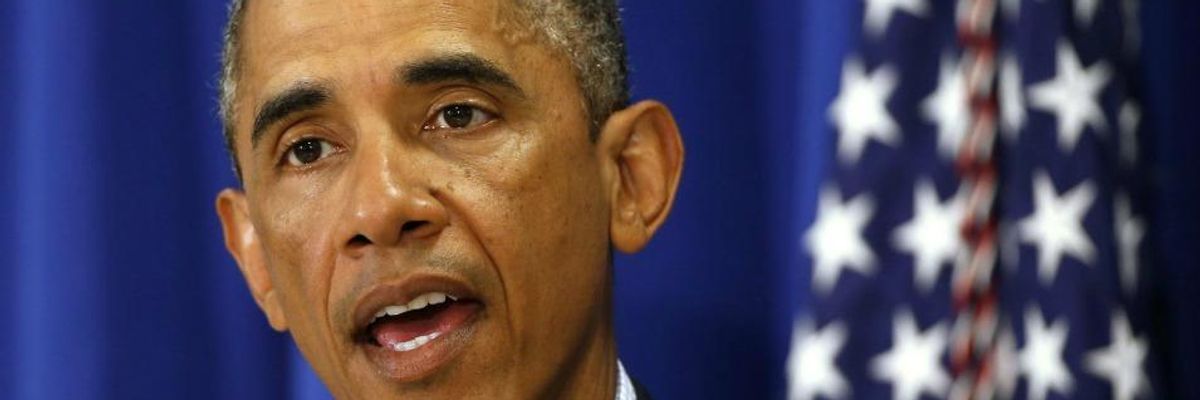The Pentagon has announced that an additional 350 U.S. soldiers will be deployed to Iraq, bringing the total to more than 1,000 troops as President Obama escalates his war against the Islamic State of Syria and Iraq (alternately known as both ISIS and ISIL).
Word of the expanded ground force came late on Tuesday just hours after a new video surfaced which appeared to show American journalist Steven Sotloff being killed by ISIS. U.S. intelligence officials later confirmed their belief that the video was authentic. Prior to being brutally beheaded in the video, Sotloff was forced to speak directly to the camera and state that his death was direct retribution for the U.S. bombing of ISIS forces and military interference in both Iraq and Syria. Two weeks ago, a similar video was posted showing the beheading of another American journalist, James Foley.
In a statement on Wednesday, President Obama deplored the killing of both journalists and said the U.S. would not forget the "terrible crime against these two fine young men" and--despite the threats from from ISIS--that U.S. forces would continue to fight the "barbaric and ultimately empty vision" the group represents.
"Our reach is long and justice will be served," vowed Obama.
The Guardianreports:
Intentionally or not, Obama has effectively responded to Isis by signaling an intensification of the latest US war in Iraq. Obama has now launched 124 airstrikes against Isis since 8 August, while swearing not to introduce "combat boots on the ground".
The new deployment brings US troops protecting the Baghdad embassy alone up to 820, the Pentagon said - a number that apparently does not include hundreds of special operations "advisers" bolstering the Iraqi military in Baghdad and Kurdish Peshmerga militia in Irbil. Should Isis attempt to attack the embassy, those troops would likely perform combat functions.
Rear Admiral John Kirby, the Pentagon press secretary, said the State Department's "critical mission" would now receive "a more robust and sustainable security presence".
The looming threat of a protracted military engagement in Iraq seems more and more likely now for U.S. forces. Though critics who warned against Obama's decision to bomb Iraq and re-deploy troops had specifically raised the alarm about "mission creep" from the beginning, the brutality of ISIS--viscerally represented by the videos of beheaded journalists--has created widespread support among both Republican and Democrat lawmakers--not to mention large sections of the population--for Obama to continue U.S. military action against the group. In fact, many on Capitol Hill are urging Obama to expand the fight in Iraq and Syria dramatically--pushing for airstrikes inside Syria and sending additional weapons to other factions on the ground who are engaged in the fight against ISIS.
Critics of such policies, however, continue to remind the public that it was the 2003 U.S. invasion of Iraq and broader U.S. foreign policy that created the conditions for ISIS to rise in the region and warn that further military escalation in either Iraq or Syria is a mistake that plays right into the hands of jihadist groups like ISIS.
As Tom Engelhardt, editor of the online magazine TomDispatch.com, wrote on Tuesday:
Though the militants of ISIS would undoubtedly be horrified to think so, they are the spawn of Washington. Thirteen years of regional war, occupation, and intervention played a major role in clearing the ground for them. They may be our worst nightmare (thus far), but they are also our legacy -- and not just because so many of their leaders came from the Iraqi army we disbanded, had their beliefs and skills honed in the prisons we set up (Camp Bucca seems to have been the West Point of Iraqi extremism), and gained experience facing U.S. counterterror operations in the "surge" years of the occupation. In fact, just about everything done in the war on terror has facilitated their rise. After all, we dismantled the Iraqi army and rebuilt one that would flee at the first signs of ISIS's fighters, abandoning vast stores of Washington's weaponry to them. We essentially destroyed the Iraqi state, while fostering a Shia leader who would oppress enough Sunnis in enough ways to create a situation in which ISIS would be welcomed or tolerated throughout significant areas of the country.
And Engelhardt warns that for Obama to be so easily goaded into escalation by the brutal videos released by ISIS would be a foolish, and rather transparent, mistake. Argues Engelhardt:
Don't consider its taunting video of James Foley's execution the irrational act of madmen blindly calling down the destructive force of the planet's last superpower on themselves. Quite the opposite. Behind it lay rational calculation. ISIS's leaders surely understood that American air power would hurt them, but they knew as well that, as in an Asian martial art in which the force of an assailant is used against him, Washington's full-scale involvement would also infuse their movement with greater power. (This was Osama bin Laden's most original insight.)
It would give ISIS the ultimate enemy, which means the ultimate street cred in its world. It would bring with it the memories of all those past interventions, all those snuff videos and horrifying images. It would help inflame and so attract more members and fighters. It would give the ultimate raison d'etre to a minority religious movement that might otherwise prove less than cohesive and, in the long run, quite vulnerable. It would give that movement global bragging rights into the distant future.
ISIS's urge was undoubtedly to bait the Obama administration into a significant intervention. And in that, it may prove successful.

